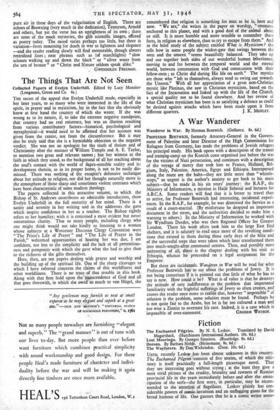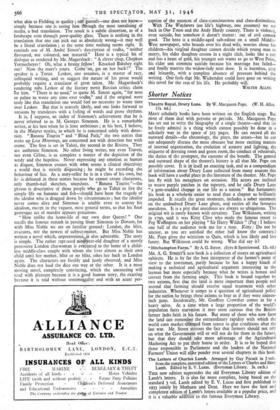Fiction
The Enchanted Pilgrim. By N. S. Leskov. Translated by David Magarshack. (Hutchinson International.Authors. 10s. 6d.) Lost Moorings. By Georges Simenon. (Routledge. 8s. 6d.) The Wayfarers. By Dan_Wickenden. (Dent. 10s. 6d.)
UNTIL recently Lesko?). has been almost unknown in this country. The Enchanted Pilgrim-consists of five stories, of which the title- story is itself practically a full-length picaresque novel. That they are interesting goes without suing; at the least they give a most vivid picture of the crudity, brutality and rawness of Russian provincial life in the years immediately before and after the eman- cipation of the serfs—the first story, in particular, may be recom- mended to the attention of flagellants. Leskov plainly has con- siderable powers of comic invention and an unflagging gusto for the broad humour of life. One guesses that he is a comic writer some- what akin to Fielding m quality ; otigguesse's—one does not know— simply because one is seeing him Itffough the most tantalising of media, a bad translation.. The result is a subtle distortion, as of a landscape seen through poor-quality glass. There is nothing in the translation that one can pick out as absolutely wrong—it may well be a literal translation • at the same time nothing seems right. It reminds one of M. Adre Simon's description of vodka, "neither flavoured, nor coloured, nor matured." Here is a typical bit of dialogue as rendered by Mr. Magarshack : "A clever chap, Chepkun Yermecheyev! Oh, what a brainy fellow! Knocked Bakshey right out! Now the mare's yours. Corile-on, get on her back!" The speaker is a Tartar. Leskov, one assumes, is a master of racy, colloquial writing, and to suggest the nature of his prose would probably require a translator of great talent. Mr. Magarshack's rendering robs Leskov of the literary merit Russian critics claim for him. "There is no need," to quote M. Simon again, "for nose or palate to waste any time over vodka," and if the original were truly like this translation one would feel no necessity to waste time over Leskov. But that is scarcely likely, and one looks forward to versions by translators with a feeling of words and prose rhythms.
It is, I suppose, an index of Simenon's achievement that he is never referred to as M. Georges Simenon. He is a remarkable writer, at his best when he is least ambitious ; at his best, I believe, in the Maigret stories, in which he is concerned solely with detec- tion. "Banana Tourist" and "Blind Path," the two stories that make up Lost Moorings, are concerned not with detection but with crime. The first is set in Tahiti, the second in the Riviera. They are authentic Simenon. No other living writer, not even Traven, not even Celine, is as complete a master of the depiction of the seedy and the hopeless. Never expressing any emotion as human as disgust, Simenon creates with what seems a clinical objectivity a world that, is strictly disgusting; he might be recording the behaviour of lice. As a story-teller he is in a class of his own, but he is defeated in these stories because he cannot create characters, only thumb-nail sketches, snapshots. "Banana Tourist "—the phrase is descriptive of those people who go to Tahiti to live the simple life on bananas and fish—shonld have been the tragedy of the idealist who is dragged down by circumstances ; but the idealist never comes alive and Simenon is unable even to convey his idealism, except in the vaguest, most general terms, so that his final grotesque act of murder appears gratuitous.
"How unlike the home-life of our own dear Queen! " One recalls the famous remark in passing from Simenon to Doreen, for with Miss Noble we are on familiar ground: London, the blitz, evacuees, not the newest of subject-matter. But Miss Noble has written a novel which, unpretentiou4; also admirable. The story
is simple. The rather repr2ssed ni ear-old daughter of a sternly possessive London charwoman is evacuated to the 'home of a child- less middle-class couple with whom she lives almost as their own child until her mother, blitz or no blitz, takes her back to London again. The characters are freshly and justly observed, and Miss Noble does not load the dice one way or the other. It is a most moving novel, completely convincing, which the unexacting will read with pleasure because it is a good human story, the exacting because it is told without sentimewlity and with an acute per-
With The Wayfarers (on life's highway, one assumes) we are back in Our Town and the Andy Hardy country. There is violence, even suicide, but somehow it doesn't matter : out of evil comoth good. The hero is a middle-aged sub-editor on a small Middle- West newspaper, who broods over his dead wife, worries about. his children—his virginal daughter cannot decide which young man to marry, his elder daughter croons in a night club, looks like a tart and has a heart of gold, his younger son wants to go to West Point, his elder son commits suicide because his marriage has failed-- and finally marries the widow-lady next door. It is harmless, cosy and leisurely, with a complete absence of pressure behind the writing. One feels thAt Mr. Wickenden could have gone on writing this novel for the rest of his life. He probably will.
WALTER ALLEN.































 Previous page
Previous page